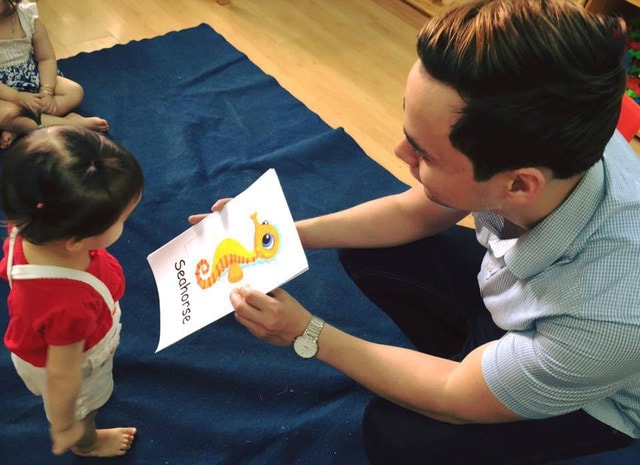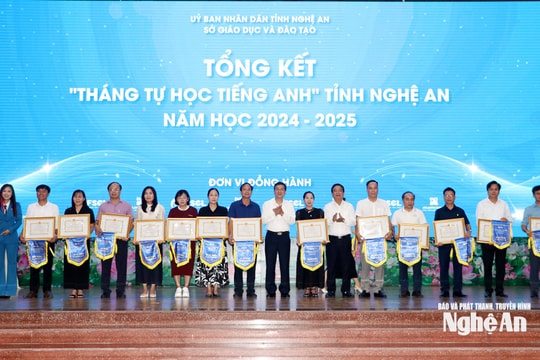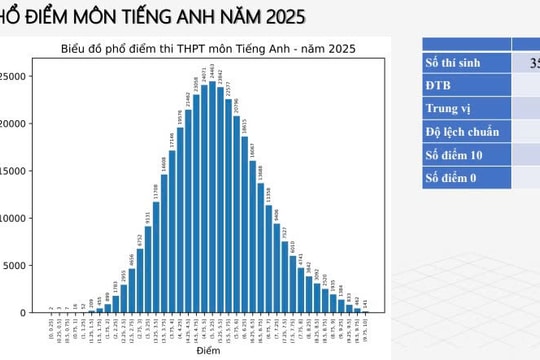Children who learn English incorrectly are prone to "language confusion"?
Learning English in particular and foreign languages in general incorrectly will cause children to be confused with knowledge, information, and easily "confused". Some experts believe that for a foreign language to become a second language, learners need an environment, books or machines, but when children are under 2 years old, they should not be exposed to too much technology.
Under 2 years old: Should not be exposed to much technology
Associate Professor, Dr. Pham Van Tinh - General Secretary of the Vietnam Linguistics Association said that if you want your child to learn a foreign language well, do not rush to let them approach it early. It is best to let children grow up innocently, perfect the most basic Vietnamese, and after perfecting their skills, then approach foreign languages systematically, which will definitely bring about results.
According to Associate Professor Tinh, in his opinion, children should have basic concepts and foundations in their mother tongue, then learn foreign languages from kindergarten or best from 5-6 years old and up.
 |
| Illustration: Internet |
“Forcing children to learn English in particular and foreign languages in general in the wrong way will cause knowledge and information interference. When they have not yet accessed the basic mother tongue system, it is difficult for children to access another language. Once children have formed their mother tongue, they can access another language,” said Mr. Tinh.
Master Nguyen Ngoc Lam - former lecturer at Hanoi University of Foreign Languages, believes that in order for students to communicate well in English as a second mother tongue (ESL - English as a Second Language), children must be exposed to and communicate with English from birth.
"You cannot learn English well when your Vietnamese is already very strong, like at the age of about 5th or 6th grade and up," said Master Lam.
Admitting that children should learn English as early as possible, even from the womb, however, according to Ms. Pham Thi Cuc Ha, an Australian Master of Education, who has many years of experience in English education and training for children of all ages, in order for English to become a second language, it is important to have a method that is appropriate for each age group.
According to MSc. Cuc Ha, for example, from 0-1 years old, it is necessary to familiarize children with the language environment through songs and games to help them learn vocabulary in the surrounding environment.
From 1-2 years old, children also get acquainted naturally in the environment of songs and games, but at this time, they gradually build their vocabulary and begin to say two words together or simple structures. From 2-3 years old, children get acquainted with vocabulary through topics, learning foreign languages like their mother tongue.
From 3-4 years old: Children should expand their vocabulary and simple sentence structures through topics.
And from 4-5 years old: Children can use sentence structures to express ideas.
From 5-6 years old: At this stage, children have a comprehensive language foundation and focus on reading and writing skills to express language...

“The key to students communicating well in English as a second mother tongue is the environment. Children can communicate with people, with television, books, newspapers and technology applications...
However, when children are under 2 years old, they should not use any technology but should listen to music. If they overuse electronic devices, their language development will be limited," Ms. Cuc Ha shared.
“Don't focus on vocabulary and structure alone”
To prevent children from being "confused", according to Master Nguyen Ngoc Lam, children must have a standard English environment from birth.
“Once children are familiar with standard English pronunciation, they will be exposed to regional accents such as Indian English, Singaporean English, Philippine English, American English, Australian English, etc., and will be able to recognize the differences in accent colors and will be able to understand most ways of speaking English from different parts of the world.
Signs of "disordered speech" in children
There are many ways to verify. First, we must test the four skills of listening, speaking, reading and writing to have a complete assessment index.
Second, you can put children in specific situations, ask questions for them to answer to see if their reflexes are correct, and if there are any deviations in their reactions and communication.
(Assoc. Prof. Dr. Pham Van Tinh - General Secretary of Vietnam Linguistics Association).
"If we simply learn English at school or a center and then expect to understand all the English expressions from all over the world, it is impossible, because in the school environment and most centers, children do not have the opportunity to communicate with a variety of those expressions to be able to adapt and gain experience," said Master Lam.
According to Mr. Lam, when teachers only teach a part of English in class and still use Vietnamese while teaching, it is impossible to achieve the environment and speaking reflexes. Not to mention the visual aids used to teach English are also not consistent.
Explaining to us further how to prevent children from being "confused" while learning English but being in an environment completely exposed to Vietnamese people, Master Cuc Ha said that it is important to have a clear language system.
“For example, tell your child a completely English sentence or a completely Vietnamese sentence. Or, after the English context is finished, speak Vietnamese,” said Ms. Ha.
In addition, according to Master Ha, the most important requirement for teachers when teaching foreign languages is to have methods suitable for each age group.
Teachers must not only teach language but also develop children comprehensively, especially focusing on students' critical thinking and creativity so that they do not only focus on memorizing vocabulary and structures but also use language to express ideas.
There are many good textbooks, but according to Master Ha, the best textbooks should be chosen to develop students' language and thinking comprehensively, not just focusing on vocabulary and structure. While teaching, teachers must popularize language knowledge along with scientific and social knowledge so that students can expand their life experiences and social knowledge./.





.jpeg)


